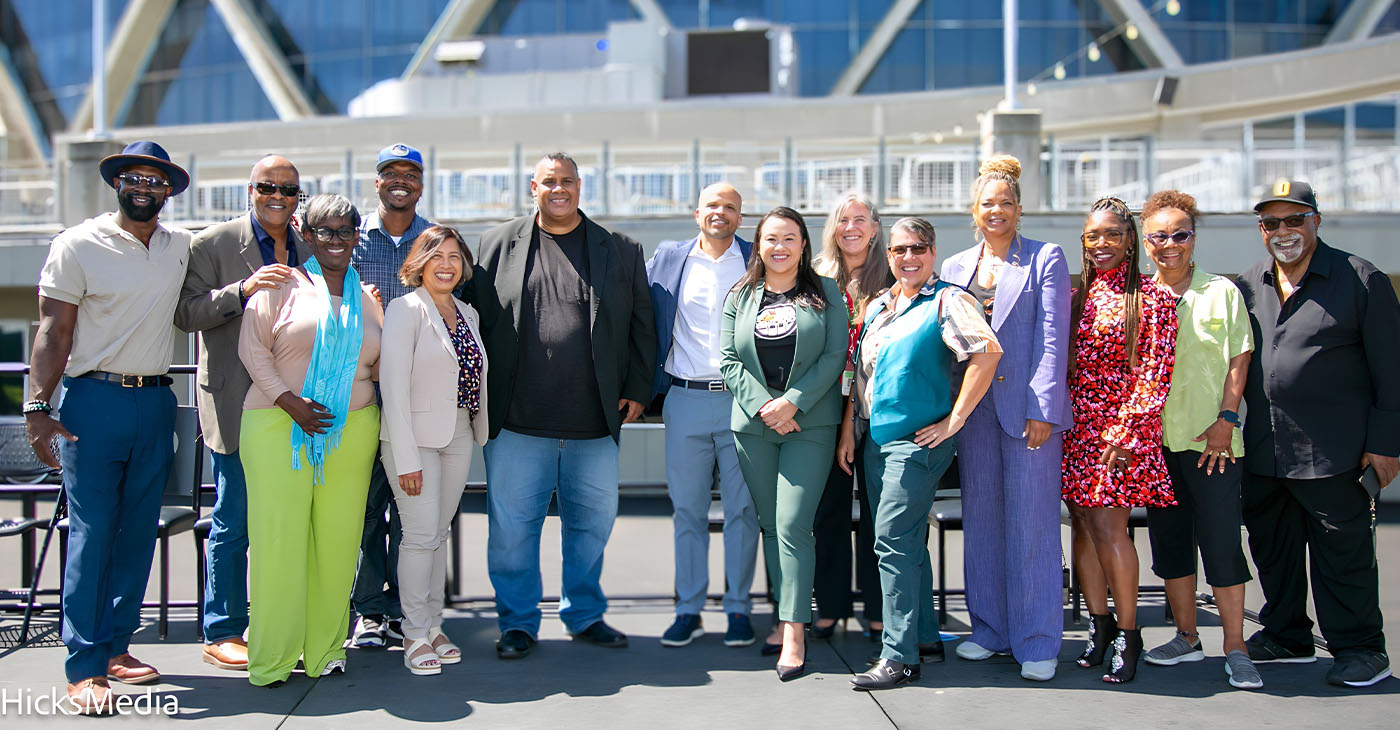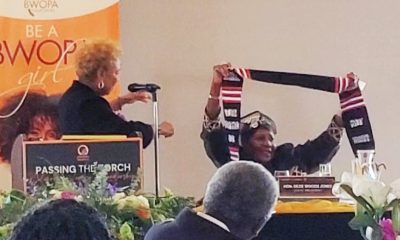Bay Area
Oakland Celebrates Signing of $105M Coliseum Sale for Revitalization of East Oakland
Last Thursday, AASEG also finalized the deal to purchase the other 50% of the Coliseum owned by the Oakland A’s for $125 million, meaning that the entire 155-acre property is now owned by the African American business group, likely the largest transfer of property to African Americans in Oakland history.

By Ken Epstein
The City of Oakland this week finalized the $105 million sale of the city’s 50% share of the Oakland Coliseum to the African American Sports and Entertainment Group (AASEG), based on a long-term plan and vision for social and economic revitalization of East Oakland that will include jobs, new businesses, and affordable housing.
Last Thursday, AASEG also finalized the deal to purchase the other 50% of the Coliseum owned by the Oakland A’s for $125 million, meaning that the entire 155-acre property is now owned by the African American business group, likely the largest transfer of property to African Americans in Oakland history.
According to a terms sheet, AASEG is paying the city $15 million in September, $15 million in November, $33 million in January 2025, and $42 million by June 20, 2026. The development is financed by Loop Capital, a Chicago-based investment firm.
Hosting the press conference at the Coliseum on Tuesday, co-founder of the AASEG team, Ray Bobbitt, a longtime Oakland businessman, introduced Mayor Sheng Thao, who he said “drove” this project for the city, along with Councilmember-at-large Rebecca Kaplan.
“This is history in the making,” said Mayor Thao, emphasizing the team effort between private investors, city officials, staff, and community that is moving the city forward.
This project is not a short-term financial fix for Oakland but a long-term strategic development that will pay off for the city and its residents for decades, she said.
“This will be a $105 million sale that will lead to a multi-billion-dollar investment in Oakland, specifically deep East Oakland,” Thao said.
“This isn’t a temporary band-aid for the budget as some naysayers may say,” she continued. “Yes, it helps keep fire stations open, it helps keep our (police) officers, and the (police) academies going. But (more fundamentally), this is a work in process for Oakland’s future.”
The mayor said she was honored to work with the African American business leaders in AASEG and with the African American entrepreneurs in Loop Capital.
“Many thought institutional capital was fleeing Oakland, but that is not the case.,” she said. “We were able to be innovative and think outside the box. (We) know what the Coliseum is; this is the place to be in the Bay Area.”
A number of observers say political opponents of the mayor and much of city’s leadership are “doom seekers,” continually emphasizing that Oakland is a terrible place to live where nothing good happens, as they seek to justify their attempt to restore power to representativesof the city’s traditional elite.
In her remarks, Kaplan outlined a vision of the redeveloped Coliseum site as a major economic hub for not just East Oakland but the Bay Area, noting that it sits near a BART station, freeway, rail line, and airport.
Ultimately, the AASEG project will be a $5 billion construction venture with housing, entertainment, live sports, hotels, and businesses.
“There is no site better prepared for development than this,” Kaplan said.
AASEG has agreed to create a community benefits plan before the end of the decade with labor agreements, workforce training, and pledges to residents around the Coliseum that they will not be displaced by development.
AASEG has also agreed to ensure 25% of any housing developed at the site is affordable.
Bobbitt, who, as a child watched games at the Coliseum from his grandmother’s roof, said the project will serve the entire population of Oakland and the region and especially communities in East Oakland, where African Americans face the highest rates of poverty, unemployment, and homelessness, and as victims of crime, he said.
He said he especially wanted to recognize Paul and Gay Cobb, owners of the Oakland Post newspaper and elders in the community, who inspired him to have a large vision for the Coliseum that would lead to the development of East Oakland, the entire city, and the region.
“We want to acknowledge them and thank them for everything they do for our community. They safeguard us, they protect us, they push us, they urge us, I want you to understand what this newspaper means for our community,” Bobbitt said.
In a statement, Bobbitt said, “The AASEG sees this new stewardship (of the Coliseum) as a once-in-a-generation opportunity for the revitalization of Oakland and a profound responsibility to improve the lives of the community members of East Oakland.”
“Thank you to the city, our partners, Mayor Sheng Thao, Rebecca Kaplan, Nikki Bas, and everyone else who contributed to this,” he said.
Council President Bas said, “There are so many positive things to love about our town, and this is an opportunity, to set aside any differences we have and to work together and make this city as great as it can be.”
Entrepreneur Alan Dones, who is part of AASEG, said, “Our team agrees that our main objective here is to serve our community, to make sure this project stands out as a beacon for what can be done when you prioritize community, good jobs, and business opportunities.”
Activism
Big God Ministry Gives Away Toys in Marin City
Pastor Hall also gave a message of encouragement to the crowd, thanking Jesus for the “best year of their lives.” He asked each of the children what they wanted to be when they grow up.

By Godfrey Lee
Big God Ministries, pastored by David Hall, gave toys to the children in Marin City on Monday, Dec. 15, on the lawn near the corner of Drake Avenue and Donahue Street.
Pastor Hall also gave a message of encouragement to the crowd, thanking Jesus for the “best year of their lives.” He asked each of the children what they wanted to be when they grew up.
Around 75 parents and children were there to receive the presents, which consisted mainly of Gideon Bibles, Cat in the Hat pillows, Barbie dolls, Tonka trucks, and Lego building sets.
A half dozen volunteers from the Big God Ministry, including Donnie Roary, helped to set up the tables for the toy giveaway. The worship music was sung by Ruby Friedman, Keri Carpenter, and Jake Monaghan, who also played the accordion.
Big God Ministries meets on Sundays at 10 a.m. at the Mill Valley Community Center, 180 Camino Alto, Mill Valley, CA Their phone number is (415) 797-2567.
Activism
First 5 Alameda County Distributes Over $8 Million in First Wave of Critical Relief Funds for Historically Underpaid Caregivers
“Family, Friend, and Neighbor caregivers are lifelines for so many children and families in Alameda County,” said Kristin Spanos, CEO, First 5 Alameda County. “Yet, they often go unrecognized and undercompensated for their labor and ability to give individualized, culturally connected care. At First 5, we support the conditions that allow families to thrive, and getting this money into the hands of these caregivers and families at a time of heightened financial stress for parents is part of that commitment.”

Family, Friend, and Neighbor Caregivers Can Now Opt Into $4,000 Grants to Help Bolster Economic Stability and Strengthen Early Learning Experiences
By Post Staff
Today, First 5 Alameda County announced the distribution of $4,000 relief grants to more than 2,000 Family, Friend, and Neighbor (FFN) caregivers, totaling over $8 million in the first round of funding. Over the full course of the funding initiative, First 5 Alameda County anticipates supporting over 3,000 FFN caregivers, who collectively care for an estimated 5,200 children across Alameda County. These grants are only a portion of the estimated $190 million being invested into expanding our early childcare system through direct caregiver relief to upcoming facilities, shelter, and long-term sustainability investments for providers fromMeasure C in its first year. This investment builds on the early rollout of Measure C and reflects a comprehensive, system-wide strategy to strengthen Alameda County’s early childhood ecosystem so families can rely on sustainable, accessible care,
These important caregivers provide child care in Alameda County to their relatives, friends, and neighbors. While public benefits continue to decrease for families, and inflation and the cost of living continue to rise, these grants provide direct economic support for FFN caregivers, whose wages have historically been very low or nonexistent, and very few of whom receive benefits. As families continue to face growing financial pressures, especially during the winter and holiday season, these grants will help these caregivers with living expenses such as rent, utilities, supplies, and food.
“Family, Friend, and Neighbor caregivers are lifelines for so many children and families in Alameda County,” said Kristin Spanos, CEO, First 5 Alameda County. “Yet, they often go unrecognized and undercompensated for their labor and ability to give individualized, culturally connected care. At First 5, we support the conditions that allow families to thrive, and getting this money into the hands of these caregivers and families at a time of heightened financial stress for parents is part of that commitment.”
The funding for these relief grants comes from Measure C, a local voter-approved sales tax in Alameda County that invests in young children, their families, communities, providers, and caregivers. Within the first year of First 5’s 5-Year Plan for Measure C, in addition to the relief grants to informal FFN caregivers, other significant investments will benefit licensed child care providers. These investments include over $40 million in Early Care and Education (ECE) Emergency Grants, which have already flowed to nearly 800 center-based and family child care providers. As part of First 5’s 5-Year Plan, preparations are also underway to distribute facilities grants early next year for child care providers who need to make urgent repairs or improvements, and to launch the Emergency Revolving Fund in Spring 2026 to support licensed child care providers in Alameda County who are at risk of closure.
The FFN Relief Grants recognize and support the essential work that an estimated 3,000 FFN caregivers provide to 5,200 children in Alameda County. There is still an opportunity to receive funds for FFN caregivers who have not yet received them.
In partnership with First 5 Alameda County, Child Care Payment Agencies play a critical role in identifying eligible caregivers and leading coordinated outreach efforts to ensure FFN caregivers are informed of and able to access these relief funds.FFN caregivers are eligible for the grant if they receive a child care payment from an Alameda County Child Care Payment Agency, 4Cs of Alameda County, BANANAS, Hively, and Davis Street, and are currently caring for a child 12 years old or younger in Alameda County. Additionally, FFN caregivers who provided care for a child 12 years or younger at any time since April 1, 2025, but are no longer doing so, are also eligible for the funds. Eligible caregivers are being contacted by their Child Care Payment Agency on a rolling basis, beginning with those who provided care between April and July 2025.
“This money is coming to me at a critical time of heightened economic strain,” said Jill Morton, a caregiver in Oakland, California. “Since I am a non-licensed childcare provider, I didn’t think I was eligible for this financial support. I was relieved that this money can help pay my rent, purchase learning materials for the children as well as enhance childcare, buy groceries and take care of grandchildren.”
Eligible FFN caregivers who provided care at any time between April 1, 2025 and July 31, 2025, who haven’t yet opted into the process, are encouraged to check their mail and email for an eligibility letter. Those who have cared for a child after this period should expect to receive communications from their child care payment agency in the coming months. FFN caregivers with questions may also contact the agency they work with to receive child care payments, or the First 5 Alameda help desk, Monday through Friday, from 9 a.m. to 5:00 p.m. PST, at 510-227-6964. The help desk will be closed 12/25/25 – 1/1/26. Additional grant payments will be made on a rolling basis as opt-ins are received by the four child care payment agencies in Alameda County.
Beginning in the second year of Measure C implementation, FFN caregivers who care for a child from birth to age five and receive an Alameda County subsidized voucher will get an additional $500 per month. This amounts to an annual increase of about $6,000 per child receiving a subsidy. Together with more Measure C funding expected to flow back into the community as part of First 5’s 5-Year Plan, investments will continue to become available in the coming year for addressing the needs of childcare providers in Alameda County.
About First 5 Alameda County
First 5 Alameda County builds the local childhood systems and supports needed to ensure our county’s youngest children are safe, healthy, and ready to succeed in school and life.
Our Mission
In partnership with the community, we support a county-wide continuous prevention and early intervention system that promotes optimal health and development, narrows disparities, and improves the lives of children from birth to age five and their families.
Our Vision
Every child in Alameda County will have optimal health, development, and well-being to reach their greatest potential.
Learn more at www.first5alameda.org.
Activism
Oakland Post: Week of December 24 – 30, 2025
The printed Weekly Edition of the Oakland Post: Week of – December 24 – 30, 2025

To enlarge your view of this issue, use the slider, magnifying glass icon or full page icon in the lower right corner of the browser window.
-

 #NNPA BlackPress4 weeks ago
#NNPA BlackPress4 weeks agoLIHEAP Funds Released After Weeks of Delay as States and the District Rush to Protect Households from the Cold
-

 Alameda County4 weeks ago
Alameda County4 weeks agoSeth Curry Makes Impressive Debut with the Golden State Warriors
-

 #NNPA BlackPress4 weeks ago
#NNPA BlackPress4 weeks agoSeven Steps to Help Your Child Build Meaningful Connections
-

 #NNPA BlackPress4 weeks ago
#NNPA BlackPress4 weeks agoSeven Steps to Help Your Child Build Meaningful Connections
-

 #NNPA BlackPress4 weeks ago
#NNPA BlackPress4 weeks agoTrinidad and Tobago – Prime Minister Confirms U.S. Marines Working on Tobago Radar System
-

 #NNPA BlackPress4 weeks ago
#NNPA BlackPress4 weeks agoTeens Reject Today’s News as Trump Intensifies His Assault on the Press
-

 #NNPA BlackPress4 weeks ago
#NNPA BlackPress4 weeks agoThanksgiving Celebrated Across the Tri-State
-

 #NNPA BlackPress4 weeks ago
#NNPA BlackPress4 weeks agoBreaking the Silence: Black Veterans Speak Out on PTSD and the Path to Recovery























































